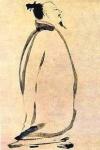Biography
Li Bai , also known as Li Bo (or Li Po; pinyin: Lǐ Bó; Wade–Giles: Li3 Po2), is a Chinese poet acclaimed from his own day to the present as a genius and romantic figure who took traditional poetic forms to new heights. He and his friend Du Fu (712-770) are the two most prominent figures in the flourishing of Chinese poetry in the mid-Tang Dynasty that is often called the "Golden Age."
Around a thousand poems attributed to him are extant, thirty-four in the canonical 18th-century anthology Three Hundred Tang Poems. The poems were models for celebrating the pleasures of friendship, the depth of nature, solitude, and the joys of drinking wine. Among the most famous are "Waking from Drunkenness on a Spring Day", "The Hard Road to Shu", and "Quiet Night Thought", which appears frequently in school texts in China today. Legend holds that Li drowned when he reached from his boat to grasp the moon’s reflection in the river.The two "Books of Tang", The Old Book of Tang and The New Book of Tang remain the primary sources of bibliographical material on Li Bai. Other sources include internal evidence from poems by or about Li Bai, and certain other sources.
Li Bai had a strong sense of himself as being part of a poetic tradition. The "genius" of Li Bai, says one recent account, "lies at once in his total command of the literary tradition before him and his ingenuity in bending (without breaking) it to discover a uniquely personal idiom...." Burton Watson, comparing him to Du Fu, says Li's poetry, "is essentially backward-looking, that it represents more a revival and fulfillment of past promises and glory than a foray into the future." Watson adds, as evidence, that of all the poems attributed to Li Bai, about one sixth are in the form of yuefu, or, in other words, reworked lyrics from traditional folk ballads. As further evidence, Watson cites the existence of a fifty-nine poem collection by Li Bai entitled Gu Feng, or In the Old Manner, which is, in part, tribute to the poetry of the Han and Wei dynasties. His admiration for certain particular poets is also shown through specific allusions, for example to Qu Yuan or Tao Yuanming, and occasionally by name, for example Du Fu.
A more general appreciation for history, is shown on the part of Li Bai in his poems of the huaigu genre, or meditations on the past, wherein following "one of the perennial themes of Chinese poetry," "the poet contemplates the ruins of past glory."
Li Bai also wrote a number of poems from various viewpoints, including the personae of women. For example, he wrote several poems in the Zi Ye, or "Lady Midnight" style, as well as Han folk-ballad style poems






